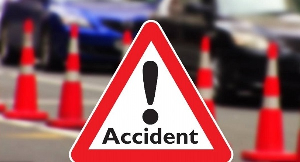Today, June 19, 2020, marks the first 100 days since Ghana recorded its first two COVID-19 cases and the country has been battling the pandemic which has not spared other countries.
The Health Minister, Kwaku Agyemang-Manu, on March 12, 2020, first announced that two individuals upon returning to Ghana from Norway and Turkey respectively had tested positive for the virus.
Following that, the nation was sent into a state of panic with an increasing number of cases being recorded up till date.
To place Ghana's situation in context, the nation has at the time of this writing recorded 12,929 COVID-19 cases since the virus was first detected on March 12, 2020. With 4,468 recoveries and 66 deaths, the active case count now stands at 8,395 as of June 19, 2020.
Additionally, the count ranks Ghana 4th in Africa after South Africa, Egypt and neighbouring Nigeria.
But how has the nation fared in its fight against the deadly novel coronavirus since it emerged?
GhanaWeb, in this peice, does a review of the country's journey and efforts towards combating the pandemic since its breakout.
The Lockdown
Ghana was sent into a three-week partial lockdown of Accra and Kumasi on March 27, 2020, by President Nana Addo Dankwa Akufo-Addo in a bid to stem the spread of coronavirus.
Two of the biggest cities, Accra and Kumasi were the worst affected metropolitan areas since the directive was announced.
While some essential and non-essential businesses were allowed to operate, the wearing of masks, regular handwashing, use of hand sanitizers and social distancing measures were encouraged.
Despite an earlier ban on large gatherings and closure of schools which has since been partially lifted, the government claimed the lockdown was oriented around a narrative of “imported cases” which mainly sought to test over 34,000 travelers who arrived in Ghana after March 3, 2020.
With contact tracing proclaimed to be one of the surest ways for the nation to “flatten the curve” of the virus, the country has seen an increasing number of hotspots quickly emerge with recorded cases surging.
Ayawaso West, Tema Metropolitan, Klottey Korle, Adentan-Madina among others became house hold names for the spread of the virus.
‘Living with the virus’
Following the lifting of some coronavirus induced restrictions by the President, the idea of ‘living with the virus’ was thrown out to the public by the Health Minister indicating ‘the virus had come to stay thus Ghanaians ought to live with it’
The idea was met with some discontent by the general public with some lamenting government was lagging in its response to deal with the pandemic.
‘Massaging the coronavirus figures’
Due to a number of mishaps in the coronavirus figures released by the Ghana Health Service (GHS), many citizens have engaged in speculations about government 'massaging the figures' to suit its policies.
An example was on Wednesday, May 27, 2020, some case count figures were uploaded on the official website of the Ghana Health Service but about some 15 minutes later, the updates were taken down.
The wrong updates pegged the number of recorded cases at 7,362, with 34 deaths and recoveries at 2,317 for the period.
The GHS during a press conference later rendered an unqualified apology to Ghanaians over the mishaps which occurred on the official coronavirus updates website.
Stranded Ghanaians abroad
In the face of government’s resolve to repatriate some stranded Ghanaians citizen abroad due to the closure of land and air borders, Foreign Affairs Minister, Shirley Ayorkor Botchwey announced the arrival of at least 1,100 persons into the country in the wake of the coronavirus pandemic.
Of the number, 230 were flown in from Kuwait, 77 from Nigeria, 41 being students who were on an exchange programme in Washington DC, United States of America (USA), 154 from Dubai and 141 students in Benin who arrived in the country via Intercity STC buses.
They are all required to undergo a mandatory quarantine of 14 days in a bid to curtail the spread of the virus into the general population should they be infected.
Mandatory wearing of nose mask
The most recent of the measures set out by government is the mandatory wearing of nose masks for all.
According to the new Executive Instrument, E.I. 164 which was signed by President Akufo-Addo on June 15, 2020, persons who fail to wear face masks in public could face a jail term of between four and 10 years or pay a fine of between GH¢12,000 and GH¢60,000 or both.
The legislative instrument is expected to be in force for a period of three months as part of stringent measures to curb the spread of coronavirus.
General News of Friday, 19 June 2020
Source: www.ghanaweb.com



![Fatawu Issahaku [L] and Jordan Ayew Fatawu Issahaku [L] and Jordan Ayew](https://cdn.ghanaweb.com/imagelib/pics/718/71828066.295.jpg)









